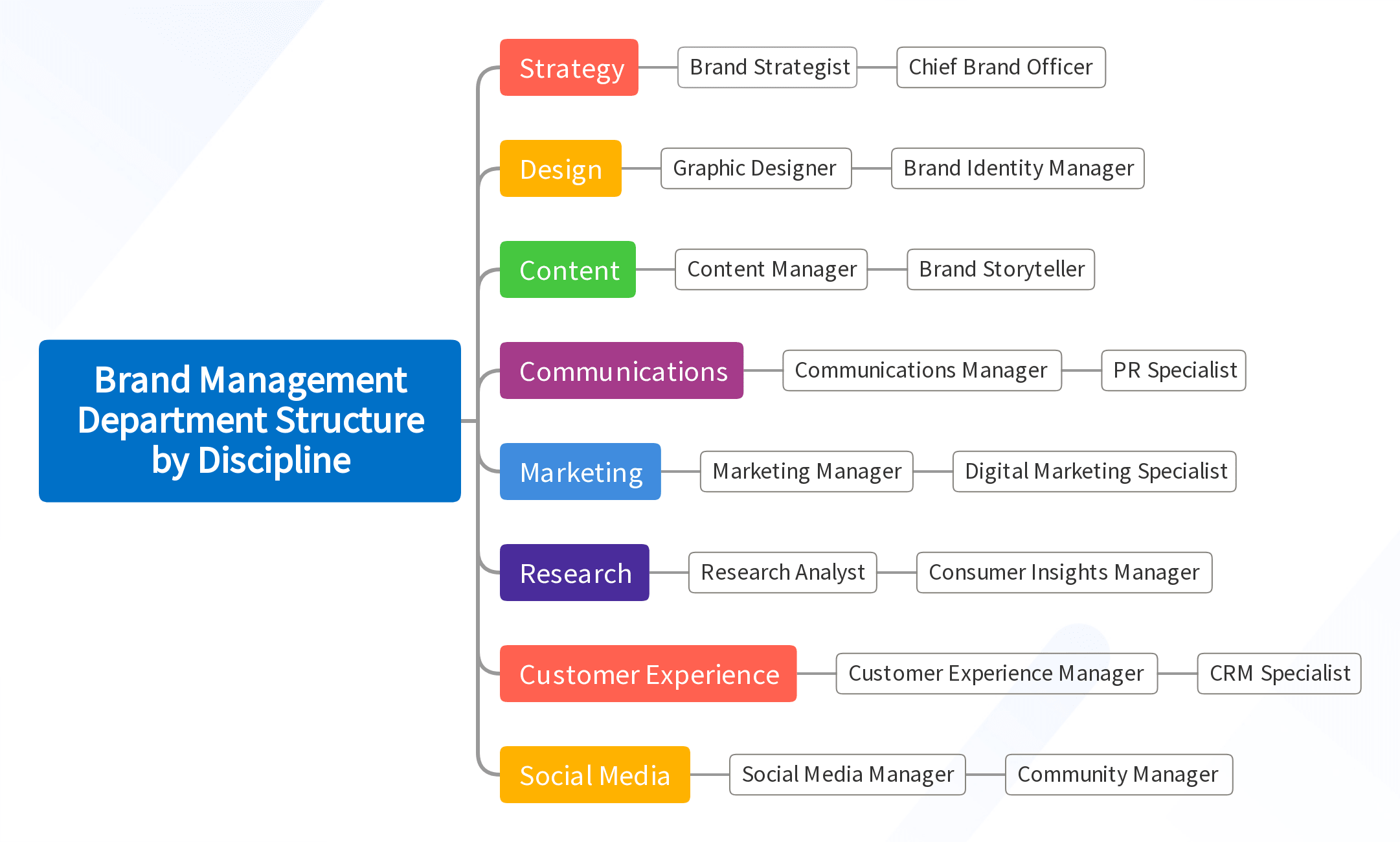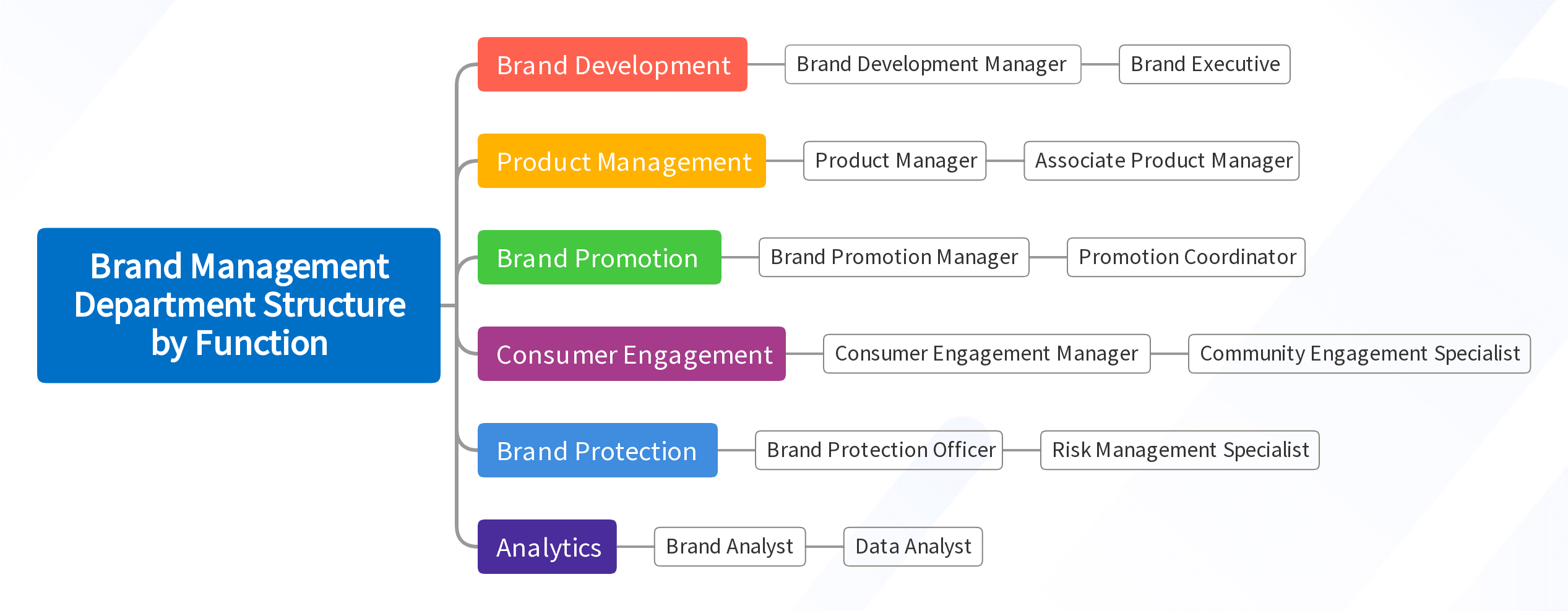

The dynamics of today's business world underscore the importance of Brand Management teams. They serve as strategic navigators, steering the brand in the bustling market seas.
Their tasks are complex, yet essential, shaping how the public perceives a company's offerings. Understanding their structure can offer valuable insights into their vital role. My partners and I have been running our own marketing agency for years so I can tell you what actually works.
But first, let's talk about the Brand Management department structures you have to choose from.
Best for Growth Marketers
Best for Paid Ads & CMO's
Table of Contents
Structuring Brand Management Department
There are two main types of department structures based on company size and resources.
- Brand Management department structure by discipline
- Org Type: Traditional corporate departments
- Best For: Midsize/Enterprise companies
- Brand Management department structure by function
- Org Type: Employees are grouped by activities and objectives
- Best For: Small to Medium Sized Business (SMB)
Let’s go in-depth to each one of them.
1. Brand Management Department Structure by Discipline


Discipline-based structure involves building teams centered around various marketing disciplines. For example, SEO, Content, Market Research, and Product Strategy could each form separate teams within a department.
| Discipline | Key Skills | Potential Roles |
|---|---|---|
| Strategy | Market Analysis, Competitive Analysis, Brand Positioning, Strategic Planning | Brand Strategist, Chief Brand Officer |
| Design | Creative Thinking, Graphic Design, User Experience, Brand Identity Development | Graphic Designer, Brand Identity Manager |
| Content | Copywriting, Content Creation, SEO, Storytelling | Content Manager, Brand Storyteller |
| Communications | Public Relations, Media Relations, Crisis Management, Internal Communications | Communications Manager, PR Specialist |
| Marketing | Product Marketing, Digital Marketing, Social Media Management, Data Analysis | Marketing Manager, Digital Marketing Specialist |
| Research | Consumer Insights, Market Research, Data Analysis, Trend Identification | Research Analyst, Consumer Insights Manager |
| Customer Experience | Customer Service, CRM, Feedback Analysis, User Experience | Customer Experience Manager, CRM Specialist |
| Social Media | Content Creation, Social Media Strategy, Community Management, Analytics | Social Media Manager, Community Manager |
2. Brand Management Department Structure by Function


Another approach is structuring by function, where teams are formed based on the different functions they perform. For example, promotion, launches, and relationship management could all be separate teams.
| Function | Key Skills | Potential Roles |
|---|---|---|
| Brand Development | Brand Strategy, Creativity, Market Research, Trend Analysis | Brand Development Manager, Brand Executive |
| Product Management | Product Strategy, Market Analysis, Project Management, Competitive Analysis | Product Manager, Associate Product Manager |
| Brand Promotion | Advertising, Event Planning, Influencer Marketing, Sponsorship Management | Brand Promotion Manager, Promotion Coordinator |
| Consumer Engagement | Community Management, Social Listening, Customer Relationship Management, Consumer Behavior Understanding | Consumer Engagement Manager, Community Engagement Specialist |
| Brand Protection | Legal Knowledge, Crisis Management, Intellectual Property Rights, Public Relations | Brand Protection Officer, Risk Management Specialist |
| Analytics | Data Analysis, Performance Metrics, Statistical Analysis, Market Intelligence | Brand Analyst, Data Analyst |
Brand Management Team Size versus Business Scale
To achieve successful marketing outcomes, you need to align the team size with your business's scale – a strategic approach that helps optimize resources and drive targeted growth.
| Business Scale | Ideal Department Size | Explanation |
|---|---|---|
| Start-up | 1-2 | Lean structure, one person can manage with support. |
| Small-Medium Business | 3-5 | Increased operations, requires specialized roles. |
| Large Enterprise | 6+ | Complex tasks demand larger, diverse teams. |
Factors to Consider When Deciding On a Brand Management Department Structure
- Company Size: Consider the size of your company. Smaller businesses might only need a few people in their brand management team, while larger corporations might require a whole department.
- Brand Complexity: The complexity of your brand can influence the team structure. If your brand extends to multiple products or services, you may need a larger, more specialized team.
- Business Objectives: Align your team structure with your business goals. If you're focused on expanding your market presence, for example, you might need team members skilled in market research and strategy development.
- Resources Available: Take into account your available resources. This includes both your budget for personnel costs and the available talent within your organization.
- External Environment: The external business environment, including market trends, competition, and customer behavior, should also influence your brand management team structure. A dynamic, adaptable team is crucial in a fast-paced business environment.
Explore other marketing departments:
- Digital Marketing Agency Team Structure
- Growth Marketing Team Structure
- Marketing Communications Team Structure
So, there you have it, a detailed overview of a Brand Management team structure. From the essence of the team and key roles, to structuring and optimizing; every aspect tailored to achieve success on your business blueprint.




















